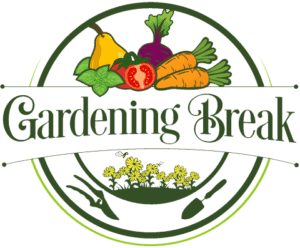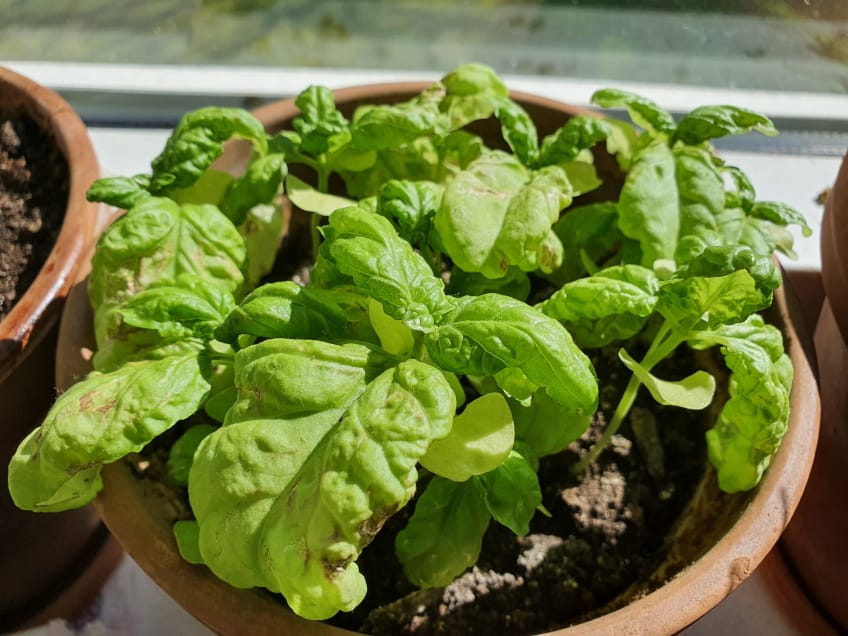
If your basil plant isn’t growing or the seeds aren’t even germinating, there is a high chance that something is wrong and needs to be fixed.
There are several potential reasons why you are having this problem but in my experience, it is usually not so difficult to identify the cause of the problem and figure out what you need to do.
In this article, I cover all of the most likely reasons why your basil plant isn’t growing including why the seeds sometimes don’t germinate, and explain what you should do. I begin with the plants, so if you are having problems with the seeds, scroll a bit down.
7 Potential Reasons Why Your Basil Isn’t Growing
1. The roots have run out of space
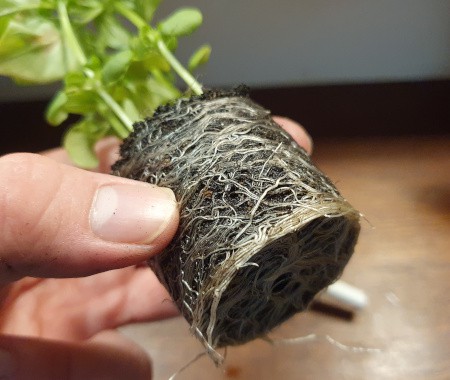
A very common reason why basil plants stop growing is that they become rootbound, which means that the roots run out of space to grow. When this happens, they can’t obtain water and nutrients efficiently and the plant will grow slower and slower until it stops entirely.
When a potted basil plant becomes rootbound, it will look like mine in the photo above. As you can see, the roots have grown so much that they can’t grow anymore in the same pot. That’s why you need to transplant it into a larger pot with more space for the roots. Once you do that, it should start growing again. I have a guide where I explain how to do it on this link.
If you aren’t sure which type of pot you should transplant your basil into, I have a guide for you here.
2. The roots are being eaten by pests
Another common issue that can cause basil plants to stop growing is that insects and other pests eat or otherwise damage the root system. If insects are the problem, you can often see some of them crawling around on the soil or the plant itself.
You won’t always be able to see them, though, as some of them stay mostly underground and others such as slugs come and go from time to time.
If the roots have been severely damaged, it is not always possible to save the plant, but if you notice the problem in time, you have a good chance. If this seems to be the problem, I recommend that you head over to the article on this link and scroll a bit down to where I explain what to do about various insects on basil plants.
3. The plant has been overwatered or underwatered
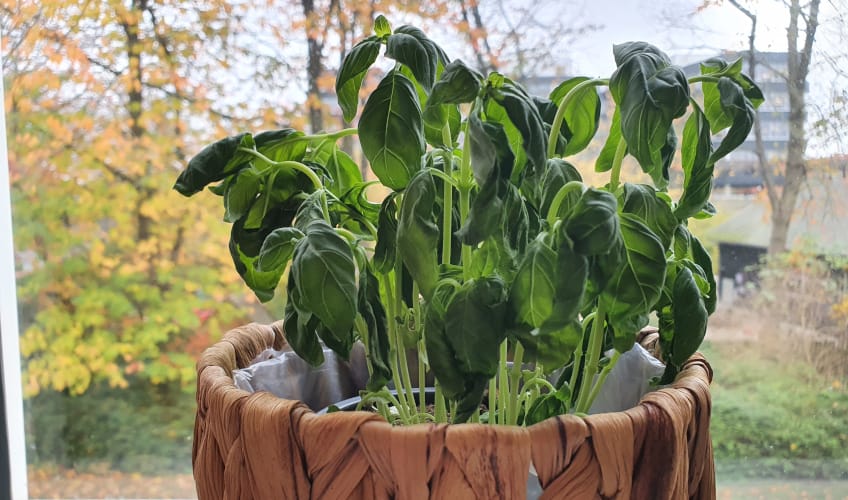
Basil plants need consistently moist soil to thrive, so it is very easy to both overwater and underwater them. Both of these mistakes can cause the plant to stop growing since it needs water to grow but too much of it can damage or even kill the roots.
The first sign of both of these problems is that the plant begins to wilt like mine in the photo above. In my experience, overwatering is far more often the problem than underwatering since one of the first things people tend to do when the plant looks like that is to water it, which only makes the problem worse if it already has too much water.
If you think you are underwatering your basil, just water it a bit more often. Remember that the soil should be moist but not too wet and never dry. If you think overwatering could be the problem, head over to the article on this link where I explain how to know with certainty and what to do about it.
4. The plant is growing in poor soil
Basil plants should grow in nutrient-rich, well-draining soil to thrive. If the soil is too nutrient-poor or doesn’t drain well enough, the plants can stop growing. A good rule of thumb to see if the soil is good enough is to look at the color and grab a handful of it and see how it feels.
Generally speaking, nutrient-rich soil is darker in color than poor soil, so if your soil is very light or almost gray, you probably have to add some organic matter such as compost to it. When you take a handful of the soil and squeeze it, it should ideally stay in a ball but break apart when you touch it. If the soil just runs through your hands, it is most likely too poor and needs organic matter.
If the soil has a high content of clay, it might have poor drainage, which means it retains water for a long time. This can damage the roots, which can cause the basil to stop growing as I explained above.
5. The plant is flowering
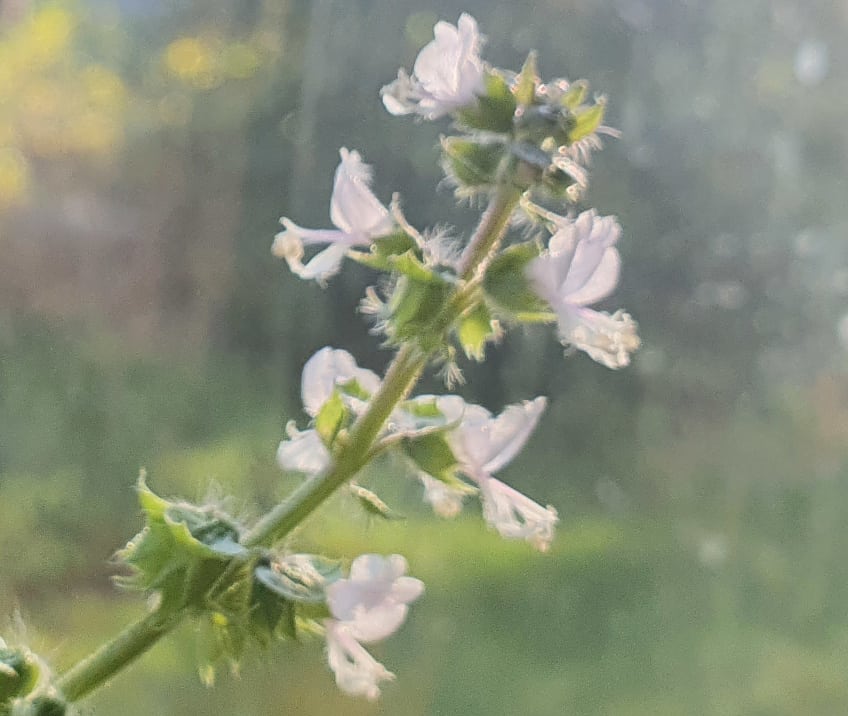
When basil plants begin to flower, they will grow and produce leaves at a slower and slower rate since the plant’s energy goes toward flowering and seed production rather than growing and producing leaves.
Basil flowers attract helpful insects to your garden, but if you want your plant to continue growing instead of flowering, you can actually often delay the flowering process. I explain all about this in the article on this link.
6. The plant is not getting enough sunlight
Basil is a Mediterranean herb so it needs a lot of sunlight. If your basil is growing in a spot that doesn’t get much sunlight or if the growing season is ending and there isn’t much sunlight overall, that might be the reason your plant isn’t growing like it used to. If that is the case, I recommend heading over to this article, where I explain what to do with basil at the end of the season.
7. The temperature is too low
Basil thrives at high temperatures. In fact, the colder it gets, the slower the plants will grow and if it gets too cold, they will stop growing entirely and eventually die.
Basil plants can’t tolerate frost, so they die when the temperature hits 32° F (0° C), but they will start to grow very slowly already at about 50° F (10° C).
7 Reasons for Basil Seeds not Germinating
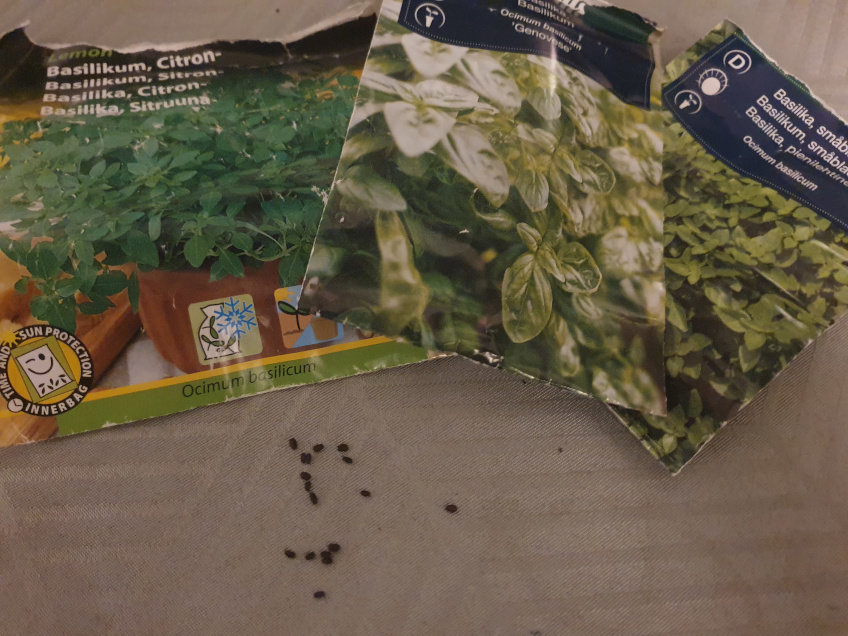
1. The seeds are too old
When I have had any seeds, including basil, that didn’t germinate, the most common reason was that the seeds were too old. The germination rate of seeds decreases over time and after enough time has passed, none of them will germinate.
How long basil seeds last depend mostly on how you store them. Store them in a cool, dark, and dry place to keep them good for as long as possible. According to this article from Agriculture and Natural Resources, University of California, basil seeds last for about 4 years when stored correctly.
2. The seeds got too much or too little water
A common mistake that can cause basil seeds to not germinate is incorrect watering. If you water the seeds too much, they can essentially drown before they grow and if you water them too little, they will never grow at all. It is best to keep the soil consistently moist.
A mistake I have made before was to allow the soil that the seeds are in to dry out. If the seeds start germinating but the soil then dries out, the tiny seedlings are likely to die. If this is what happened, you need to sow some new seeds.
3. There is not enough oxygen in the soil
If there isn’t enough oxygen in the soil, your basil seedlings might not grow. This can happen if there is a lot of clay in your soil as it can retain water for so long that the seed gets damaged. It can also happen if you water the soil too much regardless of the soil type. As I have written before in this article, keep the soil moist but don’t get it too wet as that will damage the seed or the plant.
4. The seeds were planted too deep
Basil seeds should be sown no deeper than ¼ inch, so it is very easy to sow them too deep. If you have sown your seeds too deep in the soil, they might germinate but they aren’t likely to make it out of the soil before they die. I explain more about this and share some other tips for sowing basil seeds in the article on this link.
5. The soil is too cold
Basil seeds that are sown too early in the season when it still gets cold at night might never germinate. If the spot you sowed your basil seeds in gets cold, there is a high chance that it is the reason why they don’t germinate. The ideal soil temperature for basil seeds to germinate is between 70-80° F (about 21-27° C).
6. The seeds were damaged from incorrect storage
Basil seeds need to be stored in a dry, dark, and relatively cold place (although not freezing) to last for as long as possible. If they are exposed to moisture or frost, they can easily become damaged to the point where they won’t germinate.
7. The seeds have been eaten by pests
The last reason why basil seeds sometimes don’t germinate that I want to cover is that they sometimes get eaten by pests. Small seedlings are especially at risk of this, but sometimes it can happen before the seeds even germinate
Of course, this is much more likely to happen to seeds that were sown directly in the ground as opposed to in pots, although potted basil isn’t immune either.
I usually grow my basil in pots, but if you want to grow them in the ground, I recommend that you start them in small pots and then transplant them into the ground after they reach about 4-5 inches (10-12.5 cm) in height.
Read My Complete Guide to Growing and Caring for Basil
I have written a thorough guide where I cover all parts of growing your own basil including choosing a variety, sowing the seeds, the best growing conditions, pruning, propagation, harvesting, storing, solving various problems, and a lot more. You can find the article on this link.
